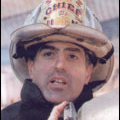Fire Rescue Development Program: Helping Firefighters In the Developing World and War-Torn Countries
In many parts of the world firefighters perform their duties in precarious conditions. They must fight fires in below-zero temperatures without gloves or boots. They must respond to hazmat incidents without breathing apparatus. They must intervene with obsolete equipment for which there are no spare parts. Often, they do not have any proper training or even uniforms identifying them as firefighters.
An initiative has been undertaken to help these firefighters. It is the Fire Rescue Development Program (FRDP), a non-profit, international, non-governmental organization (NGO). It is comprised of firefighters from nine countries on four continents with headquarters in Rome and offices in Chicago and Johannesburg, South Africa.
The FRDP was created to assist firefighters in the developing world and in war-torn countries. Help is provided in the way of training, supplying equipment, reorganization of fire services on the governmental level, administrative and managerial consultancy, and to serve as a beacon of hope in providing firefighters with a sense of dignity and pride.
The FRDP is the only fire-rescue NGO recognized by the United Nations, and FRDP members are the only firefighters in the world to serve as delegates to the UN Economic and Social Council (ECOSOC). Within the UN, the FRDP is most active in promoting sustainable development for the fire services of poorer nations and in disaster-impact reduction. Sustainable development provides assistance that allows the local firefighters to grow and evolve, and to implement programs that will continue long after international aid leaves town – in short, programs that help firefighters help themselves.
The FRDP’s successes have included solutions that are low tech, simple, practical applicable locally. The organization handles problems by using the experience of firefighters from many parts of the world and from many different cultures. What’s understood is that what may seem perfectly normal in Boston, Milan or Tokyo may not work in Bujumbura, Managua or Tashkent.
In underdeveloped countries, the FRDP works to make local firefighters efficient with the resources that are available to them. The local firefighters work with what is familiar to them and then build on that within the contexts of their own realities and culture. It makes no sense to try and implement standards of the 21st century in a country where the technology is 50 or more years behind. It makes even less sense to try to replicate the London Fire Brigade or FDNY in a country where the average firefighter may not be able to read or write, where building codes do not exist, and the local government has no money for equipment, uniforms or even miserable salaries.
Disaster-impact reduction is an area where the FRDP has been a voice for firefighters to governments around the world by its presence in the United Nations. When UN committees meet to discuss how the impacts of disasters can be reduced, attention is given to areas involving the military, civil protection and specialized groups. It has been the FRDP that presses for governments to support their fire services in order to have a real impact on reducing the effects of calamities.
The FRDP underscores the fact that no matter what the country or the emergency, it is the firehouse closest to the event that will dispatch the personnel and equipment to be first on the scene. This is as true for a car fire as it is for an earthquake. It also is a fact that a complex rescue operation beyond the capacity of the local fire service must be implemented to confront a large-scale catastrophe. These ideas will be presented in Kobe, Japan, early this year by the FRDP at the United Nations World Conference on Reducing the Impact of Disasters.
The Fire Rescue Equipment Exchange (FREE) project is another instrument used by the FRDP in helping our less fortunate colleagues. It allows used fire equipment to be donated to the FRDP that will be given to firefighters that are in need and where it is compatible with what is already in place. The program relinquishes the donors of all responsibilities, thereby avoiding any legal apprehensions that a potential donor may have. Many firefighters around the world are running into burning buildings with no personal protection. They would be extremely grateful for any piece of equipment that could make their job easier and safer. While the donated equipment may no longer meet standards and codes in many developed countries, it would be considered a godsend in many poor countries.
The FRDP is continually approached by governments and firefighters in some of the poorest countries on Earth to assist them, to help them become more efficient in protecting their citizens. Unfortunately, the FRDP is not always in a position to respond. The experience is there. The know-how is there. The qualified personnel are there. What is lacking is the financial means to carry out these programs and at times even to meet the diplomatic obligations to the UN.
The FRDP is a non-profit organization that can survive only through the generosity of others. Even small amounts go a long way, but help is desperately needed to carry out this most necessary assistance.
Donations can be made online at: www.frdp.org or by sending a check or money order in any currency to:
Robert Triozzi is chief of operations for the Fire Rescue Development Program, based in Rome. Previously, he was chief of United Nations Fire Rescue operations in Kosovo. Further information about FRDP may be obtained by contacting Chief Triozzi at [email protected].About the Author


